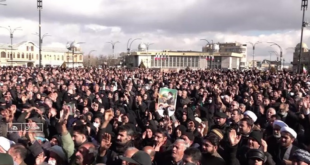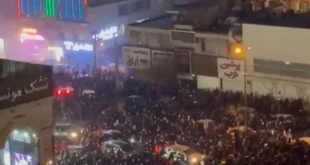The Lebanese political crisis was expected to rank high on the agenda of talks of US President George W. Bush and his French counterpart President Nicolas Sarkozy in  Washington on Wednesday, ahead of Lebanon’s presidential vote scheduled for next Monday. During a speech to Congress on Wednesday, Sarkozy said that he will work with the US to ensure Lebanon has a democratically elected president and to protect its sovereignty, democracy and freedom.
Washington on Wednesday, ahead of Lebanon’s presidential vote scheduled for next Monday. During a speech to Congress on Wednesday, Sarkozy said that he will work with the US to ensure Lebanon has a democratically elected president and to protect its sovereignty, democracy and freedom.
“What Lebanon needs is a president elected by the Lebanese people,” the french president said in his speech. “France will not accept anyone trying to subjugate the Lebanese people. No one is entitled to prevent the Lebanese to live in a free country.”
On Tuesday evening, Bush and Sarkozy voiced strong support for Lebanon’s ruling majority during a dinner hosted in honor of the French guest.
“Our two nations support the democratic government of Lebanon,” Bush said.
France and the United States have taken a strong line against Syrian involvement in Lebanon in recent weeks.
A bitter power struggle between the country’s ruling coalition supported by the West and the Hizbullah-led opposition backed by Syria and Iran is now focused on the name of the country’s next president.
President Emile Lahoud is scheduled to step down on November 24. Parliament is scheduled to meet on Monday to elect a successor. But the vote, already postponed twice, is likely to be delayed again unless there is a deal between the two rival camps, political sources quoted by Reuters said.
While the French stance on the issue of the presidential vote is to elect a head of state who “enjoys support from the majority of the people,” the US believes that in the absence of a consensus president, a new head of state should be elected by a simple majority.
Diplomatic sources quoted by AFP on Wednesday said France could move to adopt Washington’s stance, particularly after Paris failed to convince Damascus to soften its stand. Two French envoys met with President Bashar Assad on Sunday.
The sources said that France was “deceived” when they learned that Monday’s Parliament session was likely to be postponed after it appeared that “contacts have not yet ripened.”
“What is going on now is not an agreement on a consensus president, but rather on a prime minister and on the distribution of the portfolios among the key groups so that the new president would not face obstacles that could impede his performance,” said one diplomatic source.
French presidential envoys are expected in Beirut on Thursday to follow up on the talks held with Assad and the talks between Sarkozy and Bush.
While Paris and Washington were offering support for the ruling coalition, Russia appealed on Wednesday for political accord ahead of the “fateful” presidential poll and warned against any “foreign meddling.”
“Based on our firm support of Lebanon’s sovereignty, political independence and territorial integrity, we call on all of the country’s political leaders to realize the historic responsibility that lies upon them and do all they can to reach an accord,” Foreign Ministry spokesman Mikhail Kamynin said.
“This is a fateful moment for Lebanon, without exaggeration. The most important thing is that the presidential elections be in full accord with Lebanon’s law without any foreign meddling from whatever side,” he added.
In Beirut, Assistant Arab League Secretary General Hisham Youssef met with politicians from both camps on Monday in an effort to facilitate a smooth election.
“We hope that consensus would be eventually reached,” Youssef told reporters after meeting with Prime Minister Fouad Siniora. “We hope that dialogue will continue until the election day.”
Youssef also met with MP Ali Hassan Khalil, who is a member of Speaker Nabih Berri Amal’s Movement and held talks with former Prime Minister Omar Karami and Social Affairs Minister Nayla Mouawad.
Also discussing the Lebanese crisis is Cypriot Minister of Foreign Affairs Erato Kozakou Markoullis, who arrived in Beirut on Wednesday night.
Lebanese Forces leader Samir Geagea said that there are efforts to arrange a meeting between him and opposition figure and head of the Free Patriotic Movement Michel Aoun in the near future.
“I will do my best to reach an understanding with him,” Geagea said during an interview with the Central News Agency.
Aoun met last week in France with Geagea’s ally, Future Movement leader Saad Hariri in talks that were widely interpreted as a positive development toward solving the crisis.
Hariri met with US Ambassador to Lebanon Jeffery Feltman in Qoraitem Wednesday.
Geagea also said that his party would oppose any constitutional amendment to allow the election of a public sector employee. Among the presidential candidates are at least two public sector employees, Lebanese Army Commander General Michel Suleiman and central bank Governor Riad Salameh.
Geagea predicted that Syria will try until the last minute to block the election, recalling how “it defied the world to maintain its grip on the Lebanese presidency” when they pushed through Parliament a measure extending Lahoud’s term by three years in 2004.
Geagea also said that a president will be elected even if rival politicians don’t reach a deal, in a hint that he will be elected by a simple majority quorum instead of the two-thirds.
The Loyal to the Resistance parliamentary bloc said in a statement following their weekly meeting that they will consider presidential election carried out by a simple majority “a coup against the Constitution.”
“Consensus over presidential election is a national demand and the only guarantee to ensure the constitutional quorum,” the statement said.
Tight security measures will be imposed until the end of presidential election and the area between the Phoenicia Intercontinental Hotel, where many MPs are staying, and Parliament will be a military zone.
In addition, Internal Security Forces and the Lebanese Army will patrol Beirut round the clock, according to security sources.
 Eurasia Press & News
Eurasia Press & News



